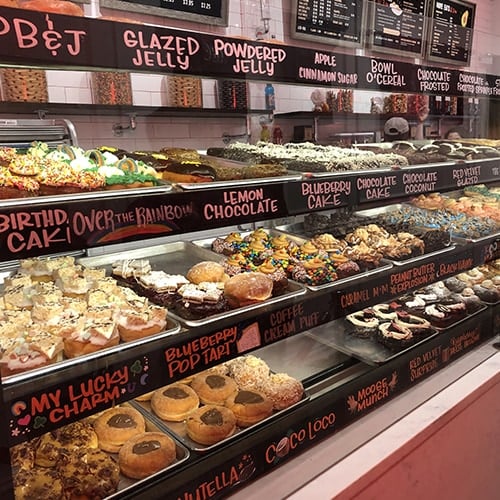
Donut shops specialize in the preparation and sale of donuts. Donuts are considered one of the most popular baked goods in the United States, and donut shops can be found in towns across the country. They've grown to become a staple of many people's morning routines, providing a much-needed pick-me-up to start the day. If you’re looking to start a donut shop, we’ve compiled a list of steps to walk you through the process.
Shop All Donut Shop Equipment1. Write a Donut Shop Business Plan

A business plan provides a clear and structured roadmap for how to start your donut shop. It outlines your goals, strategies, and financial projections, helping you stay on track and make informed decisions. One of the key purposes of a business plan is to present your concept to potential investors. Whether you seek funding from a bank, a private investor, or even friends and family, a well-crafted business plan can make a difference when securing capital.
In addition to providing a foundation for your business and attracting investors, a business plan serves as a valuable tool for you as the owner. It helps you stay focused on your goals and objectives and provides a framework for making informed decisions as you navigate the challenges of starting and running a donut shop. To learn more about this topic, read our guide on how to write a bakery business plan.
2. Investigate Donut Franchises
Franchises are regionally or nationally recognized brands that operate in many locations, allowing independent investors, known as franchisees, to purchase the rights to use the franchise name, products, and business model. The main advantage of investing in a donut shop franchise is brand recognition. Established franchises have already built a solid reputation and a loyal customer base, which can give your new business a head start. Franchisees also benefit from the support and guidance provided by the franchisor, which can be valuable if you’re new to the foodservice industry.
It's important to note that investing in a donut shop franchise comes with financial obligations. In exchange for the franchise rights, franchisees are required to pay a monthly or annual franchise fee. This fee covers the use of the franchise name, products, and business model. Additionally, franchisees are responsible for other expenses, such as marketing fees and royalty payments based on sales. We’ve listed some of the most popular donut shop franchises below:
- Krispy Kreme franchise cost: Krispy Kreme franchisees must have liquid capital of $300,000 and pay a franchise fee of $12,500 to $25,000. The average investment needed to start a Krispy Kreme shop ranges from $275,000 to $1,900,000.
- Dunkin' franchise cost: A Dunkin' franchisee must have a minimum net worth of $500,000 and pay a franchise fee of $40,000 to $90,000. On average, the total investment to start a Dunkin' franchise can range from $500,000 to $1,800,000.
- Duck Donuts franchise cost: A prospective Duck Donuts franchisee must have a minimum liquid capital of $200,000 and pay a franchise fee of $40,000. The average total cost to start a Duck Donuts ranges from $400,000 to $600,000.
- Tim Hortons franchise cost: A Tim Hortons franchisee must present a minimum liquid capital of $60,000 and pay a franchise fee of $25,000 to $50,000. The total investment needed to start a Tim Hortons ranges from $300,000 to $1,400,000.
3. Calculate the Cost of Opening a Donut Shop
The average cost to start a donut shop falls between $40,000 and $90,000. It’s important to note that this figure can vary depending on several factors, including your business concept and where you want to open your shop. To budget accordingly, you should build an understanding of these costs and how they can affect you. We’ve compiled a list of donut shop startup expenses below to help inform your decisions:
- Acquiring a commercial space: Buying a donut shop can cost between $80,000 and $300,000 while leasing a commercial space can cost an average of $5,000 per month depending on your lease agreement.
- Equipment costs: The average cost of donut shop equipment ranges from $15,000 to $30,000.
- Permits and licenses: Depending on your location, you may need to apply for permits and licenses including a sales license, zoning permit, and food handler’s license, along with completing a health inspection. Each permit may be associated with application or renewal fees.
4. Obtain Donut Shop Funding

While some prospective owners may have the necessary funds readily available, many people will need to secure loans or find investors to make their dream of owning a donut shop a reality. Remember to highlight your unique offerings and demonstrate a solid business plan to increase your chances of obtaining the necessary funding. Continue reading to learn about the different financing options available to you.
- Traditional bank loan: Traditional bank loans involve taking out a set amount of money and paying it back over a fixed period.
- Business line of credit: A business line of credit functions similarly to a credit card. You'll be provided with a set line of credit that can be used for a wide range of purchases and interest on the money you spend.
- Small business loan: Small business loans are loans available through the U.S. Small Business Administration to help entrepreneurs establish and grow their businesses.
- Crowdfunding: Finding funding through sites like GoFundMe can be an effective tool for new business owners. Supporters can donate money towards your cause and help you quickly and efficiently get the funding.
- Equipment cost: Equipment loans can be useful for getting quick money to repair or upgrade the equipment in your donut shop.
- Business credit card: Business credit cards allow you to make purchases for your business. They are effective for paying off smaller expenses and shouldn't be used in place of a larger loan.
5. Purchase Donut Shop Equipment
Donut shops require specialized equipment to function efficiently and produce high-quality donuts consistently. The type of equipment you purchase and the quantity you'll need depends on your projected output and the available space in your kitchen. We'll walk you through the equipment you'll need below.
Kitchen Equipment
Purchase the following appliances to complete your donut shop kitchen:
- Convection ovens: Ideal for baking large amounts of donuts and other treats.
- Donut glazers and finishing tables: Provide a surface for glazing and decorating your signature donuts.
- Donut depositors: Allows you to distribute the perfect amount of dough for your donuts.
- Dough mixers: Perfect for preparing dough in the kitchen.
- Dough scales: Allows you to verify your dough is portioned correctly.
- Donut baskets and screen racks: Ideal for cooling donuts and other baked goods.
Front of House Equipment and Supplies
The equipment and supplies listed below allow you to design a functional front-of-house area:
- POS equipment: Allows you to conduct transactions.
- Display cases: Perfect for highlighting your signature donuts.
- Menu boards: Ideal for displaying your menu or specials.
- Bakery boxes: Allows customers to take multiple donuts on the go.
- Paper cups: Ideal for serving coffee, tea, and other beverages.
- Lids: Ensures that guests do not spill their beverages on the go.
- Coffee stirrers: Allows guests to prepare coffee as they see fit.
6. Create a Donut Shop Menu
Your menu is the centerpiece of your donut shop, and in many cases, it's the first thing customers see when they walk in. Choosing what to offer on your menu can be difficult, and it's crucial to get it right. Keep the layout of your menu in mind and highlight customer favorites or limited-time promotions. When it comes to pricing your menu, be strategic. Consider the cost of ingredients, preparation time, and overhead expenses, and offer a range of price points so that customers with different budgets can find something they enjoy.
- Offer a variety of treats: Include donuts, donut holes, and other baked goods on your menu. This gives your customers access to a wide range of selections and ensures they will find something they enjoy.
- Highlight seasonal items: Consider adding themed items to your menu throughout the year to boost sales. For example, you could offer pumpkin spice donuts during the fall or holiday-themed donuts during the winter season.
- Don't forget drinks: Expand your menu to offer coffee, tea, or smoothies, complementing your donut selection and giving guests more variety to choose from.
7. Advertise Your Donut Shop
Advertising is crucial for creating awareness and generating excitement for your donut shop. Marketing costs can vary depending on your business type, goals, and the marketing strategies you choose. As a small business owner, it's essential to allocate a portion of your budget towards advertising to ensure your donut shop gets the attention it deserves.
On average, donut shops spend 5-8% of their revenue on advertising. While this may vary based on individual circumstances, it provides a general guideline for budgeting purposes. Keep in mind that the more you invest in advertising, the greater the potential return on investment. To help identify the strategy that works best for you, we've listed some donut shop marketing methods below:
- Traditional marketing: Traditional methods, such as print media and radio advertisements, can be effective with local audiences. Place ads in local newspapers or magazines highlighting your unique offerings. Radio commercials can be a great way to reach commuters and capture their attention during their daily commute.
- Social media marketing: Platforms like Facebook and Instagram are excellent tools for reaching a wide audience at a minimal cost. Create engaging posts showcasing your delicious donuts, behind-the-scenes footage of your shop's preparation, and sneak peeks of your menu.
- Word of mouth: Encourage your friends, family, and loyal customers to spread the word about your donut shop. Offer them incentives, such as discounts or freebies, for referring new customers.
8. Hire and Train a Donut Shop Staff

Your employees are the backbone of your business, and having the right team in place can make all the difference in how efficiently your shop operates. When it comes to hiring, it's not just about finding people with the necessary skills. It's about finding individuals who fit into your company culture and can contribute to a positive workplace environment. A strong company culture not only attracts customers but also helps to retain employees, reducing turnover and ensuring continuity in your operations.
As an employer, your responsibility doesn't end with hiring employees. It's equally important to invest time and resources into training them properly. This ensures that they have the knowledge and skills to perform their duties effectively and consistently. Below, we've created a list of tips to guide you through the hiring process.
- Write clear position listings: Clearly defining the job positions and their requirements will help you attract candidates who best fit your needs.
- Recruit effectively: Depending on the location of your donut shop, you may need to actively recruit and advertise your job openings to reach potential employees. Online job boards, social media, and local networking can help you cast a wider net and find the right talent.
- Conduct interviews and background checks: Asking behavioral-based questions and checking references can provide valuable insights into a candidate's work ethic, problem-solving abilities, and compatibility with your team.
9. Host a Soft Opening
A soft opening is a limited, invite-only unveiling of your donut shop. It's an opportunity for you and your staff to have a dry run before the grand opening, and it can also generate positive word of mouth for your business. During the event, consider offering a limited menu or highlighting your signature donuts. This way, you can focus on perfecting a smaller selection of items, ensuring they are prepared to the highest standard.
The limited, invite-only nature of a soft opening also creates a sense of exclusivity and anticipation among your guests and allows you to receive valuable feedback. Their opinions and suggestions can help you identify areas for improvement and make necessary adjustments before opening to the public.
Donut Shop FAQ
We've answered some of the most common questions about starting a donut shop below.
How Much Does it Cost to Open a Donut Shop?
The cost of starting an independent donut shop ranges from $50,000 to $150,000, but this number can fluctuate based on a variety of factors. The location you choose, the amount of equipment you need to purchase, and potential renovations to your shop can all impact your initial investment.
How Much Profit Does a Donut Shop Make?
A small donut shop situated in a highly trafficked area can rake in up to $150,000 in profit annually. It's important to note that donut shop sales can fluctuate seasonally. January and February often see low profits as customers kick off the new year with resolutions to eat healthier. As summer approaches, donut shop owners can expect an upward trend in sales, with a sharp increase coming in the fall.
Back to Top
Starting a donut shop requires careful planning, a solid business strategy, and a large amount of hard work. Donut shops come with significant financial and operational obligations, but when executed correctly they can be very successful. By adhering to the information above, you can position yourself and your donut shop for success in a competitive industry.





